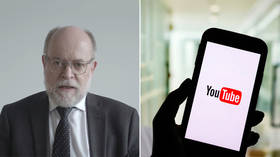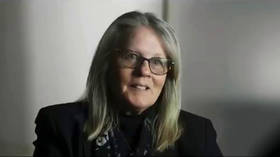Dystopian and disturbing: Big Tech censorship lumps together conspiracy loons and proper scientists

YouTube has set itself up as the world’s thought police over Covid-19 and is shutting down the voices of highly respected experts. This has dangerous consequences for us all, as scepticism and questioning gets us closer to truth.
As far as YouTube is concerned, it is the arbiter of what can and cannot be said about how to fight the threat posed by the coronavirus. Dissidents’ views must not be seen or heard on its channels! That is why it decided to clamp down on anyone who dares question the wisdom of the current lockdown.
YouTube’s censorious attitude is not confined to policing conspiracy theorists and flat-earth nutters, either. Recently, it has removed a video of the respected epidemiologist Dr Knut M Wittkowski’s discussion of how to understand and respond to the Covid-19 pandemic. This popular video, watched by 1.5 million people, was one of the rare resources that offered a serious scientific view challenging the official consensus.
Wittkowski is a well-known scientist and academic, who, for 20 years, was head of biostatistics, epidemiology, and research design at the Rockefeller University’s Center for Clinical and Translational Science in New York. Unfortunately, your scientific credentials count for nothing if you dare challenge the Covid-19 consensus policed by the Big Tech companies. In the eyes of YouTube, he has committed the unpardonable sin of criticizing the official advice on how to deal with the pandemic.
Big Tech companies are entirely open about their right to police the debate that surrounds Covid-19 related policy. When YouTube CEO Susan Wojcicki told an interviewer that anything that contradicted the recommendations of the World Health Organization would be removed from her platform, she projected an imperious image of someone possessing the sacred authority of a god.
The implication conveyed by digital censors is that the scientific and policy-related guidelines as to how to respond to coronavirus are beyond debate. From their perspective, Wittkowski does not deserve to be heard, even though his ideas make sense to millions of people across the globe. As it happens, many of Wittkowski’s views on how to manage Covid-19 echo those of Swedish policymakers. Does that mean YouTube believes some of the pronouncements made by Swedish public health officials should be censored in order to prevent those in the Anglo-American world from being misled?
It is precisely in global emergency that attempts to close down discussion can have such damaging consequences. Instead of inviting and welcoming a wide range of opinion, the UK government was swayed by the scaremongering projection of one person: Neil Ferguson. His model warned of a staggeringly large number of potential deaths. Thankfully, we now know that his model was fundamentally flawed. It was the lack of debate around his flawed advice that encouraged policymakers to adopt such a badly worked out response.
The censorship of conflicting opinion is always damaging to public life. Its effects are particularly insidious in relation to controversies in the domain of science. Scepticism and questioning is integral to scientific advance. This position was recognised centuries ago, when one of Britain’s oldest and most respectable scientific institutions, the Royal Society, was founded with the motto ‘Nullius in verba’ – that is, “On the word of no one.” The advice it conveys is clear: knowledge about the material world should be based on evidence rather than authority. Without constant questioning, science loses its vitality and turns into a dogma.
Also on rt.com Slavoj Zizek: The Schmidt-Cuomo digital future is a highway to the MatrixEven if they are proven to be wrong, academics such as Wittkowski raise important questions that hold their colleagues to account. It is through having to respond to critics that scientists have an opportunity to test out their ideas and develop them further. Openness to debate is essential in a dynamic situation such as that we find ourselves in today, when the unfolding trajectory of the pandemic continually forces scientists to question and rethink their ideas in light of the most recent experience. Shutting down minority views on its epidemiology seriously undermines the scientific quest for an understanding of the workings of Covid-19.
YouTube’s demand for unquestioning submission to official policy also compromises the capacity of ordinary people to learn about the pandemic. It assumes they cannot be trusted to engage with dissenting views, and deprives all of us from being exposed to the questions raised by people like Wittkowski. By not allowing us to make up our own mind about the arguments advanced by dissident scientists, YouTube reduces its viewers’ status to that of children. And such censorship not only violates our right to come to our own conclusion – it also insults our intelligence.
Like this story? Share it with a friend!
The statements, views and opinions expressed in this column are solely those of the author and do not necessarily represent those of RT.















